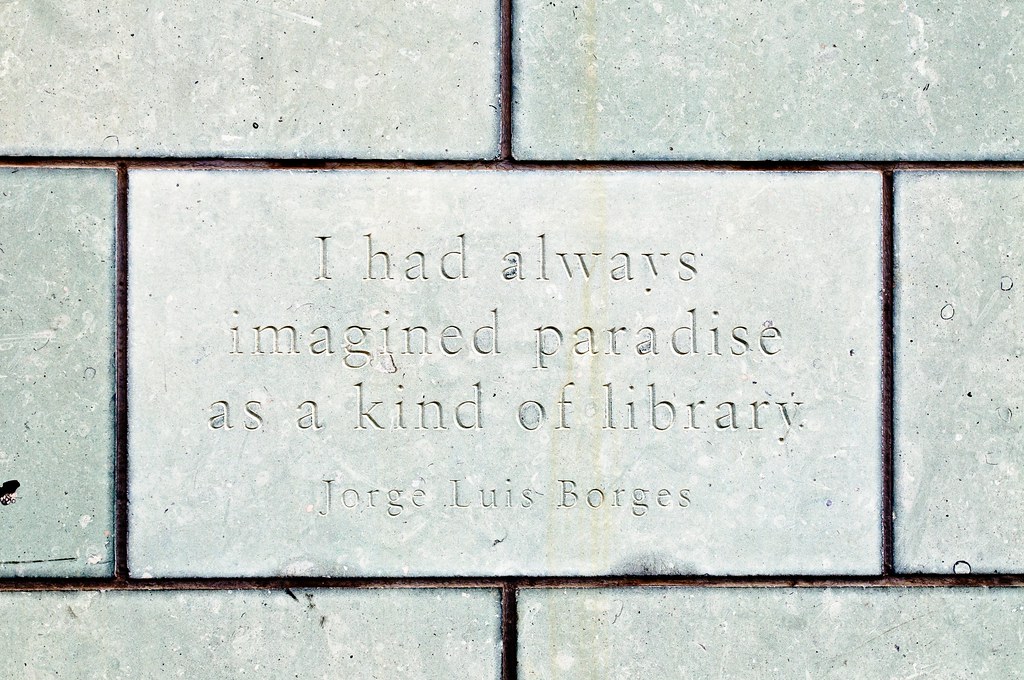.

Head of an angel: Piero della Francesca, 1460, San Francesco, Arezzo (image by Sailko, 2009)
He was, however, impersonal, not in his method only, as all great artists have to be, but he was what would be commonly called impassive, that is to say, unemotional, in his conceptions as well. He loved impersonality, the absence of expressed emotions, as a quality in things. -- Bernard Berenson, Italian Painters of the Renaissance, 1897For some -- the faint of heart, perhaps -- it had been a relief at least to know there had been no one on hand to witness the event.
Well, almost no one.

La Proximité de la Mer (Borges), Canary Wharf, London: photo by galaad, 4 April 2010

La Proximité de la Mer (Borges), Canary Wharf, London: photo by galaad, 4 April 2010
Still, the sentence, one would have liked to think, had never been meant to take so long to finally be carried out.
Or had it?


St. Julian: Piero della Francesca, 1455-1460, Pinacoteca Communale, Sansepolcro (image by Sailko, 2009)
Indeed the waiting had always been the worst part. The long nights in particular, the great dark stretches, winding and tortuous, the obscure paths appearing at times to lead somewhere but finally, no; and punctuated then, with abrupt efficiency, by a small black dot.
It's that bit at the end which one never got to see. Still one could not help but imagine it as being very beautiful.
It's that bit at the end which one never got to see. Still one could not help but imagine it as being very beautiful.

I had always imagined paradise as a kind of library (Borges): photo by Ryan Dearth, 30 January 2011

Quando a curiosidade é infinita, o mundo se torna igualmente infinito? (Borges): photo by Alice Barreto, 25 May 2010
This puts me in mind of a passage from the Confidence Man, (from chapter 13)
ReplyDeleteAt intervals they slowly quaffed several glasses in silence and thoughtfulness. At last the merchant's expressive face flushed, his eye moistly beamed, his lips trembled with an imaginative and feminine sensibility. Without sending a single fume to his head, the wine seemed to shoot to his heart, and begin soothsaying there. "Ah," he cried, pushing his glass from him, "Ah, wine is good, and confidence is good; but can wine or confidence percolate down through all the stony strata of hard considerations, and drop warmly and ruddily into the cold cave of truth? Truth will not be comforted. Led by dear charity, lured by sweet hope, fond fancy essays this feat; but in vain; mere dreams and ideals, they explode in your hand, leaving naught but the scorching behind!"
Bowie
Tom - The elements mingle here to make a beautiful and unsettling poem. The clouds stagger me. There's finality and a radiant opening there, inseparable, one entangled in the other. I'm going away to think about punctuation - thank you.
ReplyDeleteHerman Melville, via Bowie, and Barry have eloquently articulated the two sides to this:
ReplyDelete"Truth will not be comforted. Led by dear charity, lured by sweet hope, fond fancy essays this feat; but in vain..."
"The clouds stagger me. There's finality and a radiant opening there, inseparable, one entangled in the other.."
Tom – You've framed those Piero angels and Berenson’s talk of impassivity in a way that has really got under my skin. I find the angels uncanny: compelling, and scaring. I see this in their faces: that what makes them more than human is in equal measure what makes them less than human. Beautifully impassive and inexpressive, in a way that makes me feel that the Fall into time, labour and suffering was a price worth paying for our being en-livened.
ReplyDeleteBarry,
ReplyDeleteHang on to that feeling for as long as you possibly can.
Now that the world hasn't ended, and we must go on attempting to be human a bit longer, any sensings such as you have just described may just yet have a chance to (almost) save the day.
What these Rapture guys don't seem to be able to face, as you suggest, Tom, is the far harder task of carrying on living humanly, or living the end of the world and the willing of it back into existence moment by mundane moment. Which isn't exactly a walk-over for any of us, but I suppose I prefer the company of folks whose ways of dealing with our common existential dilemmas don't involve fantasies of mass annihilation against their fellow strugglers and sufferers.
ReplyDeleteI've been carrying this with me for the last couple of days. As Barry says, it's a beautiful and unsettling poem. The images are combined in an extraordinary way. For some reason, as I've been thinking about it, I keep returning to a memory of a cartoon Caroline told me about once, which may have originally appeared in the New Yorker. A professional colleague of hers in their pleasant, but always high-tension record company office shared it with her. By the time Caroline entered the music industry in the mid-1970s, major record companies really were ahead of their time as business entities in that among key executives and staff one found black, white, male, female and just about every ethnic and religious group; things were really more diverse than a foxhole in a typical WWII movie and the company benefited because of it. Still, human nature being what it is, competition was fierce, jealousies raged and most people hated each other. Anyway, the cartoon read something like: "In the future, there will be no hatred or discrimination because of race, creed or gender. Everyone will hate each other for purely personal reasons."
ReplyDeleteSometimes I feel that to be living in the days of the Rapture is to be living in a cartoon. I especially felt that last night on a city bus when a young man sitting next to me in a Giants jacket and wearing headphones removed his headphones to chat. I commented he should be feeling good because Lincecum had just shut out the A's over in the city. He said no, he's an A's fan. Then he said all his friends had been annoying him all evening with Doomsday conversation. Because of that little earthquake, I asked. Yeah, he said. They won't shut up about it. We rode on toward the epicenter.
ReplyDelete